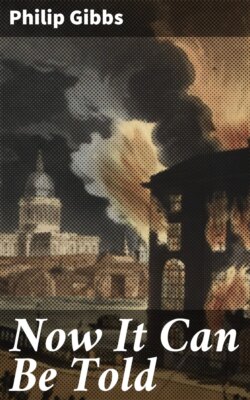Читать книгу Now It Can Be Told - Philip Gibbs - Страница 24
На сайте Литреса книга снята с продажи.
XVII
ОглавлениеTable of Contents
Gen. Sir Neville Macready was adjutant-general in the days of Sir John French, and I dined at his mess once or twice, and he came to ours on return visits. The son of Macready, the actor, he had a subtlety of mind not common among British generals, to whom “subtlety” in any form is repulsive. His sense of humor was developed upon lines of irony and he had a sly twinkle in his eyes before telling one of his innumerable anecdotes. They were good stories, and I remember one of them, which had to do with the retreat from Mons. It was not, to tell the truth, that “orderly” retreat which is described in second-hand accounts. There were times when it was a wild stampede from the tightening loop of a German advance, with lorries and motor-cycles and transport wagons going helter-skelter among civilian refugees and mixed battalions and stragglers from every unit walking, footsore, in small groups. Even General Headquarters was flurried at times, far in advance of this procession backward. One night Sir Neville Macready, with the judge advocate and an officer named Colonel Childs (a hot-headed fellow!), took up their quarters in a French chateau somewhere, I think, in the neighborhood of Creil. The Commander-in-Chief was in another chateau some distance away. Other branches of G. H. Q. were billeted in private houses, widely scattered about a straggling village.
Colonel Childs was writing opposite the adjutant-general, who was working silently. Presently Childs looked up, listened, and said:
“It's rather quiet, sir, outside.”
“So much the better,” growled General Macready. “Get on with your job.”
A quarter of an hour passed. No rumble of traffic passed by the windows. No gun-wagons were jolting over French pave.
Colonel Childs looked up again and listened.
“It's damned quiet outside, sir.”
“Well, don't go making a noise,” said the general, “Can't you see I'm busy?”
“I think I'll just take a turn round,” said Colonel Childs.
He felt uneasy. Something in the silence of the village scared him. He went out into the roadway and walked toward Sir John French's quarters. There was no challenge from a sentry. The British Expeditionary Force seemed to be sleeping. They needed sleep—poor beggars!—but the Germans did not let them take much.
Colonel Childs went into the Commander-in-Chief's chateau and found a soldier in the front hall, licking out a jam-pot.
“Where's the Commander-in-Chief?” asked the officer.
“Gone hours ago, sir,” said the soldier. “I was left behind for lack of transport. From what I hear the Germans ought to be here by now. I rather fancy I heard some shots pretty close awhile ago.”
Colonel Childs walked back to his own quarters quickly. He made no apology for interrupting the work of the adjutant-general.
“General, the whole box of tricks has gone. We've been left behind. Forgotten!”
“The dirty dogs!” said General Macready.
There was not much time for packing up, and only one motor-car, and only one rifle. The general said he would look after the rifle, but Colonel Childs said if that were so he would rather stay behind and take his chance of being captured. It would be safer for him. So the adjutant-general, the judge advocate, the deputy assistant judge advocate (Colonel Childs), and an orderly or two packed into the car and set out to find G.H.Q. Before they found it they had to run the gantlet of Germans, and were sniped all the way through a wood, and took flying shots at moving figures. Then, miles away, they found G.H.Q.
“And weren't they sorry to see me again!” said General Macready, who told me the tale. “They thought they had lost me forever.”
The day's casualty list was brought into the adjutant—general one evening when I was dining in his mess. The orderly put it down by the side of his plate, and he interrupted a funny story to glance down the columns of names.
“Du Maurier has been killed … I'm sorry.”
He put down the paper beside his plate again and continued his story, and we all laughed heartily at the end of the anecdote. It was the only way, and the soldier's way. There was no hugging of grief when our best friend fell. A sigh, another ghost in one's life, and then, “Carry on!”
